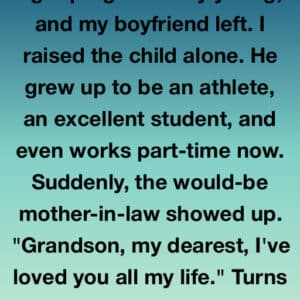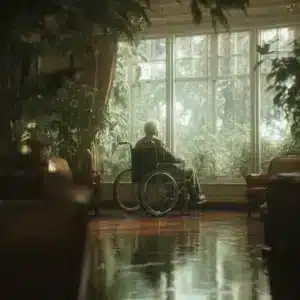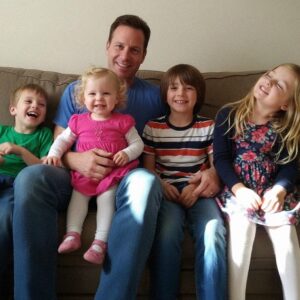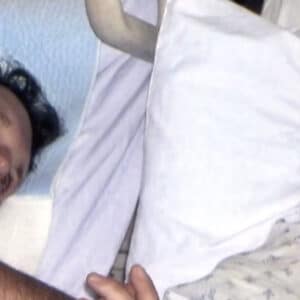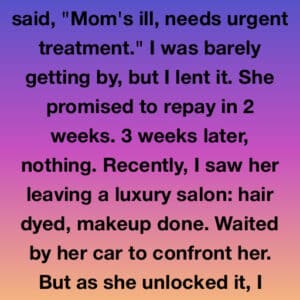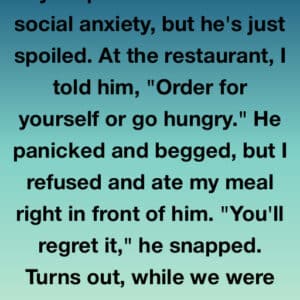I thought I knew everything about my husband—his habits, his fears, the way his forehead creased when he was trying to do mental math. I knew how he took his coffee, which songs made him nostalgic, the exact tone his voice took when he was about to say “It’ll be okay” even if he wasn’t sure it would.
I didn’t realize there was something huge he’d been keeping from me, hidden in the quiet space between him and his family. I only found out because his mother and sister got careless with their whispers.
Peter and I had been married for three years. We met during one of those whirlwind summers that feel like a movie montage—late nights, cheap wine, and long walks that kept stretching until sunrise. Everything with him just clicked. He was smart, funny in this dry, understated way, and kind in all the small, important ways that actually matter. When we found out I was pregnant with our first child a few months into the relationship, it felt reckless and terrifying… and somehow exactly right.
Our son was born healthy, loud, and perfect. We figured out parenthood together one sleepless night at a time. Then, not long after, I found out I was pregnant again. This time, we were married, settled, and planned. We told ourselves, “Now we’re really doing this—a family.”
From the outside, our life looked pretty close to perfect.
But I was American, and Peter was German. At first that difference felt exciting. We joked about our cultures, laughed at misunderstandings, swapped languages over dinner. When Peter’s job transferred him back to Germany, we decided to move with our son. I thought it would be an adventure, a fresh start—picturesque streets, Christmas markets, a bilingual childhood for our kids.
Germany was beautiful. Peter was thrilled to be home. I wanted to match his joy so badly. But reality doesn’t bend just because you want it to.
I missed my family. My friends. The ease of walking into a store and knowing exactly what you’re buying without double-checking Google Translate. I felt like a guest in my own life for a while.
Peter’s parents, Ingrid and Klaus, didn’t speak much English, but I understood more German than anyone realized. At first, I let them assume I didn’t. It felt safer that way. A language buffer. A little distance.
They visited often, especially Ingrid and Peter’s sister, Klara. They would sit in the living room with Peter, talking and laughing in German while I tidied the kitchen or played with our son. It didn’t bother me at first. I told myself, “This is good. They’re bonding. I’ll catch up.”
Then the comments started.
“That dress… it doesn’t suit her at all,” Ingrid said one afternoon, looking straight at me and then away, like I was a TV in the background.
“She’s gained so much weight with this pregnancy,” Klara added, her mouth twisting into a smirk.
I looked down at my belly, at the soft fabric stretching around it, and felt my hands move there automatically. Yes, I was pregnant. I knew I wasn’t at my “best angle.” But hearing them critique my body like I was some stranger walking by on the street stung more than I wanted to admit.
They didn’t bother lowering their voices. They assumed the language locked me out. I decided not to correct them. Part of me was cowardly; part of me was curious. I wanted to see what they really thought when they believed I couldn’t understand.
One afternoon, I was standing just out of sight in the hallway when I heard Ingrid say, “She looks tired. I wonder how she’ll manage two children.”
Klara let out a small laugh. “I’m still not sure about that first baby,” she said. “He doesn’t even look like Peter.”
I felt my heart drop into my stomach.
Ingrid sighed. “His red hair… it’s not from our side of the family.”
“Maybe she didn’t tell Peter everything,” Klara added.
They both laughed—soft, conspiratorial, ugly.
I stayed frozen by the doorway, my fingers digging into the wall. They were talking about our son. My son. The little boy who had Peter’s serious expression when he was concentrating and my habit of kicking in his sleep. I wanted to storm into the room and scream at them. Instead, I just stood there, shaking, and said nothing.
Their words stuck to me like burrs, clinging no matter how often I tried to brush them off.
The next visit after our second baby was born nearly broke me.
I was exhausted—raw, hormonal, running on patches of sleep—juggling a newborn and a toddler who suddenly needed me more than ever. Ingrid and Klara arrived with polite smiles and store-bought cake. They cooed over the baby, asked the right questions, and made all the right noises. But the air around them felt thick, charged with something unspoken.
They kept slipping away to whisper in corners. Whenever I walked into a room, their conversation changed shape mid-sentence.
While I sat in the nursery feeding the baby, I heard them again in the hallway, their voices low but distinct.
“She still doesn’t know, does she?” Ingrid whispered.
Klara chuckled. “Of course not. Peter never told her the truth about the first baby.”
My heart stumbled in my chest.
The truth about our first baby?
The bottle slipped slightly in my hand, and I tightened my grip so I wouldn’t drop it. I leaned toward the door, straining to hear more, but they moved farther down the hallway. Their voices blurred into indecipherable sounds.
I sat there, the baby latched to me, my mind racing.
What hadn’t Peter told me?
When they finally left, and the house fell quiet again, the questions were so loud they drowned out everything else.
That night, after the kids were finally down and the dishwasher hummed softly in the background, I called Peter into the kitchen. My legs felt shaky, my palms damp.
“Peter,” I said, barely recognizing my own voice, “what is this about our first baby? What haven’t you told me?”
He frowned at first, confused, but when he saw my expression, the color drained from his face. His eyes widened. He sat down heavily at the table and buried his face in his hands like a man waiting for impact.
“There’s something you don’t know,” he said quietly, looking up at me with guilt etched into every line of his face. “I should have told you a long time ago.”
The room seemed to tilt.
“When you gave birth to our first…” he began, then stopped, gathering himself. “My family… they pressured me to get a paternity test.”
The words hit me like a slap.
“A paternity test?” I repeated slowly, as if saying it out loud would somehow make it less absurd. “Why? Why would they do that?”
“They thought the timing was… too close,” he said, voice breaking. “We started dating right after you ended things with your ex. Then, suddenly, you were pregnant. And the red hair—” He shut his eyes. “They said the baby couldn’t be mine. They wouldn’t let it go.”
I could barely breathe. “So you took a test… behind my back?”
He stood up, his hands shaking. “I didn’t do it because I didn’t trust you,” he insisted. “I never doubted you. But they kept pushing and pushing. It was constant. I felt trapped. I just wanted them to shut up.”
“And what did the test say, Peter?” I asked, my voice no longer steady. “What did it say?”
He swallowed, looking like he might be sick. “It said… it said I wasn’t the father.”
The kitchen walls felt like they were closing in around me.
“I never cheated on you,” I whispered. “Not once. How could that—how could that even be possible?”
“It didn’t make sense to me either,” he said quickly. “I know he’s my son. In every way that matters. I held him the moment he was born, and I knew. But the test… it came back negative.”
He rubbed his forehead, frustration and pain twisting his features. “I told my parents it was positive. I lied to them. I wanted them to drop it, to stop making everything about this stupid test. But eventually, I cracked and admitted what it had said. That’s what they meant today—they know the result.”
I took a step back, my whole body trembling. “So all this time… all these years… you’ve believed that he might not be yours? And you didn’t tell me?”
“It’s not that I believed it,” he insisted, voice breaking. “It’s that the doubt was there. I hated that it was there. I didn’t want you to see it. I didn’t want you to think I doubted you. I thought if I kept it to myself, it wouldn’t hurt anyone.”
“It’s hurting me now,” I said, tears spilling over.
I thought of our son’s first laugh, the first time he said “Papa,” the way Peter had slept in a chair at his hospital bedside when he’d gotten a bad fever. All of those moments now had a new, ugly layer over them.
“We have to get another test,” I said suddenly, clinging to the one thing that made sense. “A new one. A proper one. Something was wrong with that first one—mixed up samples, a bad lab, something. It has to be wrong.”
Peter reached for my hands, but I pulled them away.
“How come you don’t see it?” he asked, desperate. “The timing… we started seeing each other so soon after your last relationship ended. Maybe you were already pregnant and just didn’t know yet. It happens. The test didn’t change how I felt about you or him. I didn’t care if he was biologically mine. I chose both of you. That’s why I stayed quiet. I was scared, but I wanted a family with you more than anything.”
“You should have trusted me enough to tell me,” I said, my voice shaking. “We could have faced this together. We could have checked the test, questioned it, fought your family’s assumptions. Instead, you were living with this behind my back while I walked around completely in the dark. You let your parents judge me and our son while you stayed silent.”
“I know,” he whispered. “I was a coward. I thought I was protecting you. I see now I was just protecting myself from a difficult conversation. I’m so sorry.”
“I need air,” I said, my chest tight.
I walked out onto the balcony and let the cold night air hit my face. The stars looked blurry through my tears. I wrapped my arms around myself and tried to make sense of the mess.
On one side, there was betrayal—the test, the secret, the years of silence. On the other side, there was the man who had changed diapers at 3 a.m., who had rocked colicky cries away, who had stayed beside me through a brutal labor with our second baby, who had moved countries for his job but brought us with him because he couldn’t imagine leaving us behind.
He had lied. But not to hurt me. He had lied because he was scared and weak and human. And he had stayed. He had loved our son with his whole heart anyway.
I thought of our little boy’s red hair, the way Peter braided it clumsily when I was too tired to do it in the mornings. I knew in my bones Peter was his father, no matter what any lab report had once said.
I wiped my face with the back of my hand and took a deep breath.
We had two children now. An entire life built between us. Two families, two cultures, one home. I couldn’t pretend this hadn’t hurt me, but I also couldn’t pretend that walking away would hurt any less.
I went back inside.
Peter was still at the kitchen table, his head in his hands. He looked up when he heard me, eyes red and swollen. He looked like he’d aged ten years in the span of one conversation.
“I’m sorry,” he said again, voice barely above a whisper. “I’m so, so sorry.”
I stood there for a moment, just looking at him. Then I let out a long breath.
“This isn’t something I’ll get over overnight,” I said softly. “I feel betrayed. I feel hurt. I feel angry at you and at your family and at that stupid test. But I know you. I’ve seen you every day for years. You didn’t walk away. You didn’t treat our son any differently because of this. You made a terrible choice, but you also made a thousand good ones.”
He nodded, tears slipping down his cheeks.
“We’ll get another test,” I added. “Not because I doubt myself, but because I need the ground under my feet to stop shifting. And we’re setting boundaries with your family. I’m done being their silent punching bag.”
He nodded again, more firmly this time.
“I still love you,” I said, the words feeling both fragile and solid. “But we’ll need help rebuilding this. Trust doesn’t grow back overnight.”
“I’ll do whatever it takes,” he said. “Therapy, boundaries, new tests—anything. I just don’t want to lose you. Or him.”
I walked over, my heart still bruised, and sat down across from him.
“We’ll figure it out,” I whispered. “Together.”
And for the first time that night, it felt less like the end of something and more like the painful, necessary beginning of a truth we should have faced long ago.
